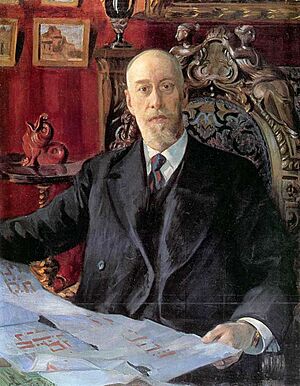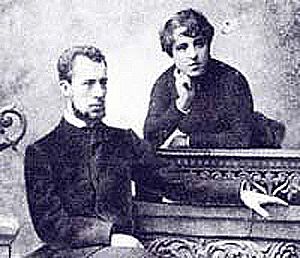Nikolai von Meck facts for kids
Quick facts for kids
Nikolai von Meck
Николай Карлович фон Мекк |
|
|---|---|

Portrait by Kustodiev, 1913
|
|
| Born |
Nikolai Karlovich von Meck
April 28, 1863 Moscow, Russian Empire
|
| Died | May 24, 1929 (aged 66) |
| Nationality | Baltic German/Russian |
| Occupation | Engineer, entrepreneur |
| Spouse(s) | Anna Davydova |
| Parents |
|
Nikolai Karlovich von Meck (Russian: Никола́й Ка́рлович фон Мекк; born April 28, 1863 – died May 24, 1929) was a smart engineer and businessman in the Russian Empire. He helped build and improve Russia's railways in the early 1900s. Later in his life, he faced difficulties with the new Soviet government and was executed in 1929.
Contents
Nikolai von Meck's Life
Nikolai was the sixth son in a large family of eleven children. His father, Karl Otto Georg von Meck, came from an old noble family from Baltic-German areas. Karl von Meck was one of the first people to build railways in the Russian Empire. This happened after Russia's defeat in the Crimean War, which made the tsar want to modernize the country.
Sadly, Karl died suddenly in 1876. Nikolai's mother, Nadezhda von Meck, inherited a lot of money. She became a famous supporter of the arts. She had a special friendship with the famous composer Pyotr Ilyich Tchaikovsky. Through his mother, Nikolai also met other important artists, like Claude Debussy, who stayed with their family when he was young. Nikolai even wrote that Debussy had the family nickname "le boulliant Achille," which means "the boiling Achilles."
In 1883, Nikolai married Anna Davydova. She was the niece of Pyotr Tchaikovsky, the famous composer.
Starting a Career in Railways
Nikolai first went to the Imperial College of Law in St. Petersburg. But he decided that he didn't want to be a lawyer. Instead, he wanted to work in the railway business. He asked his mother if he could leave school without finishing his degree.
Even without a higher education, Nikolai worked hard. He started as a fireman on a train, then became an engineer, and later a clerk on the Nikolaev Railway. By 1884, he was chosen as a candidate member for the Board of the Moscow-Ryazan railway. In 1890, he became a full member of the Board.
Leading the Moscow-Kazan Railway
In April 1891, Nikolai was made the chairman of the Moscow-Kazan railway. For more than 25 years, until the government took over the railways in 1918, he was a key person in expanding this company. He helped develop Russia's transport system a lot.
During his first nine years as chairman, the Moscow-Kazan railway grew from 233 kilometers to 2,100 kilometers long! This included building many new lines. Nikolai von Meck made sure the company had professional staff and modern equipment. He was respected by his employees, business partners, and even by the government and the royal family. Big banks in Russia also invested in his company.
In 1903, as chairman, he helped organize a special trip for Emperor Nicholas II and his family to a monastery. When the Russian-Japanese War started, Nikolai von Meck also helped organize charity shipments to support the army.
Supporting Education and Employees
Nikolai believed in training people. He opened technical schools and helped spread educational books. His company also supported groups that helped railway workers get supplies.
In 1912, the company started building apartment buildings for workers. They also created a settlement where employees could get loans to buy land. These loans were for three years' salary and could be paid back over 10 years. The plan included improving electricity, telephone lines, water supply, and building hospitals. However, the start of World War I in 1914 stopped these plans from being fully completed.
Interest in Cars
Nikolai was also very interested in cars and racing. In 1899, he bought one of the first cars in Russia. In 1903, he helped start the Moscow Automobile Club and became its first head. He organized and took part in Russia's first car races in 1910–1911. He even owned several Moscow license plates.
Nikolai von Meck's Many Activities
Nikolai von Meck was an active member of many different groups and societies. He was involved in:
- The Imperial Russian Automobile Society, where he was a committee member and vice-president.
- The Russian Society of Sea, River, and Land Transport.
- Being an honorary trustee for a hospital for women.
- The Imperial Philanthropic Society, which helped people in need.
- The Moscow branch of the Imperial Russian Musical Society.
- The Moscow Society of Aeronautics, which was about flying.
- Collecting donations for the Russian navy and helping to fund an airplane in 1913.
- The Russian-American Chamber of Commerce.
- A historical and family history society in Moscow.
- A board of trustees for a famous girls' school.
- A society that helped spread useful books.
- The Board of the Russian-Asian Bank.
After the Russian Revolution
After the Russian Bolshevik Revolution, the new Soviet government took over the Moscow-Kazan Railway in 1918. Nikolai von Meck hoped his skills and experience would still be useful. He continued to work as a consultant for the railway system and wrote books about his ideas for transport in Russia.
However, because he came from a wealthy family, he was arrested many times starting in 1919. He was accused of speaking against the Soviet system and trying to cause problems. He was arrested for the last time in 1928. In May 1929, he was sentenced to death for "wrecking," which meant trying to sabotage the government's work. He was executed on May 24, 1929. Many years later, in 1990, he was officially cleared of these charges by the Supreme Court of the USSR.
Nikolai von Meck's Family
Nikolai and Anna had six children:
- Kira (1885–1969)
- Andrew (who died as a child)
- Marc (1890–1918, who was executed)
- Galina (1891–1985), who lived in England and wrote a book about her family. She also translated letters between Tchaikovsky and her family.
- Attal (1894–1916), who died in his first battle during WW1.
- Lyutsella (1896–1933)
In 1904, Nikolai von Meck adopted a girl named Helen. Her parents had died during a cholera outbreak. Helen later became the mother of a famous academic named Nikita N. Moiseev.
Grand Duchess Elizabeth Feodorovna once described Nikolai von Meck as "an honest servant of the King and Fatherland." This shows how much he was respected for his dedication to his country.


